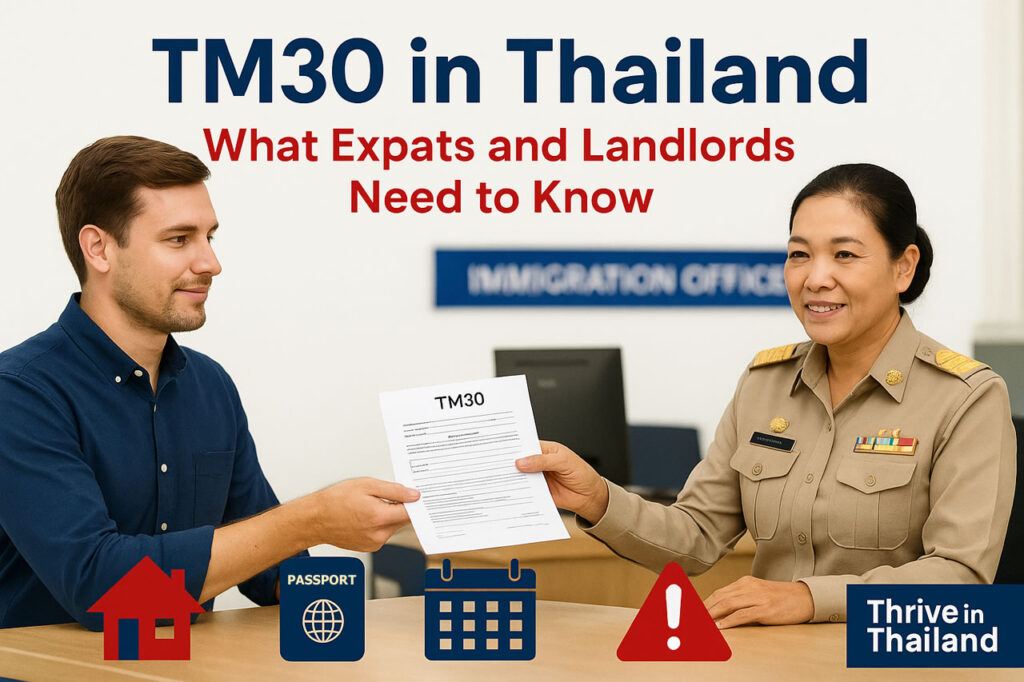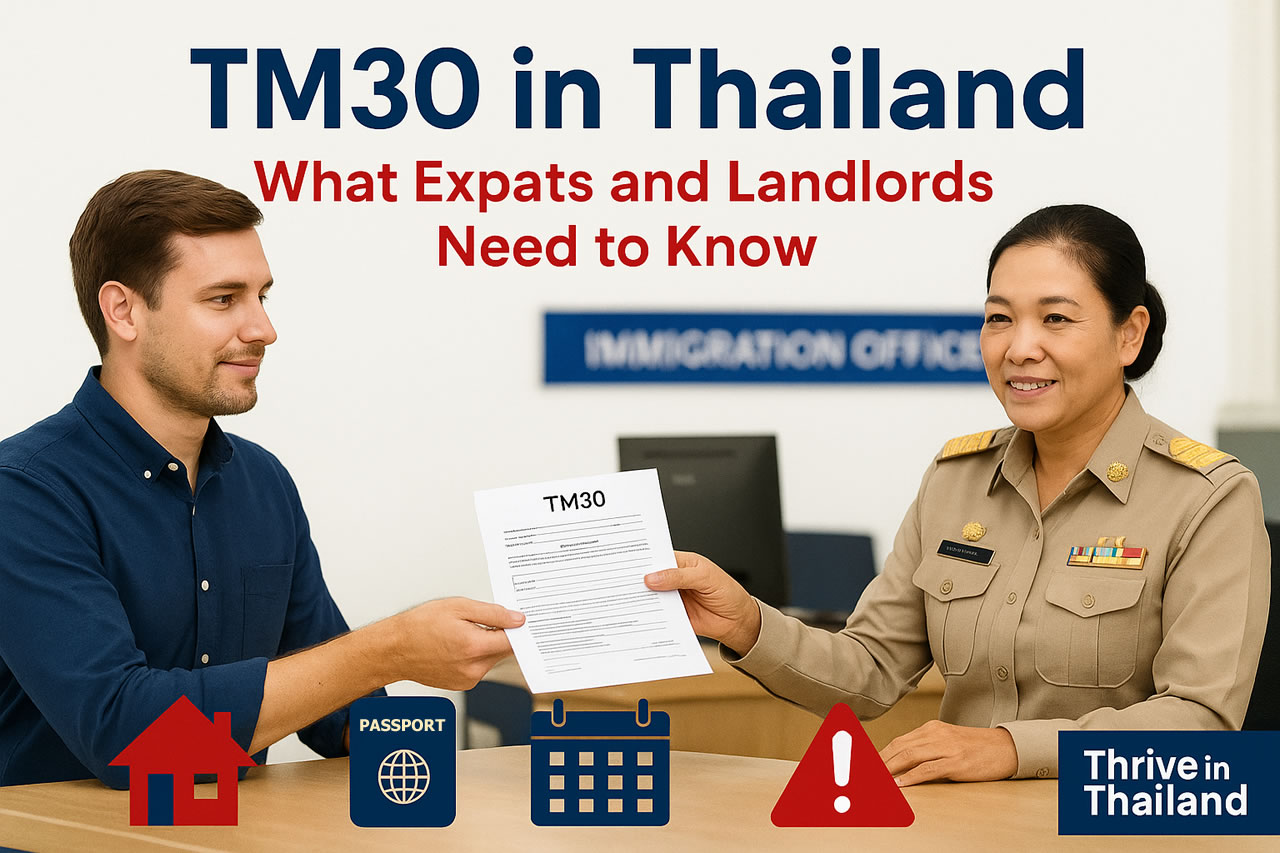
Why the TM30 Still Matters
If you’ve spent any time in Thailand as an expat, tourist, or property owner, you’ve probably heard about the infamous TM30—and not always with a smile. It’s one of those bureaucratic hurdles that seems confusing at first, frustrating to deal with, and easy to ignore… until it causes real problems.
So what is it exactly? The TM30 is a form used to notify Thai Immigration of a foreigner’s place of residence. It’s based on a law that’s been around since 1979, and despite multiple calls to modernize or scrap it altogether, it’s still very much enforced today. In short, whenever a foreigner stays at a property—whether it’s a condo, house, or hotel—the owner or manager must report that stay to Immigration, usually within 24 hours.
Sounds simple, right? In theory, yes. But in practice, the TM30 has been a recurring headache for landlords, long-stay expats, and even short-term visitors. Delays, confusion, online glitches, and unclear enforcement have turned what should be a quick notification into a real source of stress.
This article breaks down the TM30 in plain language. Whether you’re a tourist, a digital nomad on a long visa, or a landlord renting to foreigners, this is your no-nonsense guide to understanding how the system works—and how to avoid getting caught out.
What Is the TM30?
The TM30, officially titled “Notification from House-Master, Owner or the Possessor of the Residence where Alien has Stayed”, is part of Section 38 of Thailand’s 1979 Immigration Act. It requires property owners or occupants to report the presence of any foreign national (non-Thai) staying at their premises—even temporarily.
In simple terms: if a foreigner sleeps at your property, you’re expected to tell Immigration within 24 hours. This applies to hotels, guesthouses, condos, houses, or even homestays. The idea is to help authorities keep track of where foreigners are staying in the country at any given time.
Here’s where things get tricky: even if you’ve reported your address before, a new TM30 may be required each time you return from a trip abroad, or if you move to a different location—even just across town.
While this sounds like overkill, it’s the law. Immigration uses the TM30 to monitor foreign residents, and failing to comply can lead to fines or delays with visa services like 90-day reporting or extensions.
Despite being over four decades old, the TM30 system has been tightened in recent years. Immigration offices around Thailand now often check for an up-to-date TM30 before processing other services. So even though it’s a hassle, it’s one you really don’t want to skip.
Who Needs to Report?
One of the most confusing aspects of the TM30 is figuring out who’s actually responsible for submitting it. Is it the foreigner? The landlord? The hotel? The answer depends on the situation—but the law is clear about one thing: someone has to report.
Here’s a breakdown:
Private Property Owners and Landlords
If a foreigner stays in a condo, house, or apartment, the property owner or landlord must file the TM30. This includes:
- Thai nationals renting to foreigners
- Foreigners who own a property and live in it themselves
- Thai spouses of foreign residents who own the family home
📌 If you’re an expat and own your own condo, you are considered the “possessor of the residence” and must report your own stay—even if it feels like reporting to yourself.
Hotels, Guesthouses, and Resorts
Registered hotels and accommodations generally handle TM30 filing automatically as part of the check-in process. If you’re staying at a hotel, you’re likely covered—but it’s still wise to ask at reception whether the TM30 has been submitted. Sometimes, especially in smaller guesthouses or Airbnb-style rentals, the process can fall through the cracks.
Foreign Tenants – When It Falls on You
In practice, some landlords may not file the TM30, either out of neglect or because they’re unfamiliar with the requirement. Unfortunately, that doesn’t let you off the hook.
While the legal obligation lies with the property owner, foreigners are the ones who often face the consequences—delays in visa extensions, fines at Immigration, or refusal of 90-day reports. Many expats choose to file the TM30 themselves to be safe, even if it technically isn’t their job.
📌 If you’re a foreigner staying anywhere that’s not a hotel—and especially if you own the place—it’s smart to ensure the TM30 gets filed. Immigration won’t accept “my landlord didn’t do it” as an excuse.
When Is TM30 Reporting Required?
This is where things get a bit frustrating—because TM30 reporting isn’t a one-time deal. It’s required every time a foreigner stays at a new address, even if they’ve lived in Thailand for years or are returning to the same place after a short trip.
Here are the key situations where TM30 reporting is required:
Arrival from Abroad
Any time a foreign national enters Thailand and stays at a private residence, a new TM30 must be filed within 24 hours of their arrival—even if it’s the same address they previously reported. Returning from a quick trip to Singapore or Laos? You still need a new TM30.
Change of Address Within Thailand
Moved across town? Switched condos? Staying at a friend’s place for a few months? That counts. A new TM30 is required each time a foreigner changes their residence—temporary or long-term.
Short Domestic Trips (When It’s Not Required)
If you leave your residence temporarily to travel within Thailand—say, a weekend in Chiang Rai or a business trip to Bangkok—you generally don’t need to file a new TM30 if you return to the same home and your visa remains valid.
That said, Immigration enforcement can vary depending on the office. If you’re unsure, it’s never a bad idea to check with your local Immigration office or file a new TM30 just to stay on the safe side.
Every Return Can Trigger a New Report
This is the one that surprises most long-stay expats: even if nothing changes, just leaving the country and coming back often triggers the need for a new TM30. Immigration considers each re-entry to Thailand as a new “stay” at your residence—even if your visa and address remain the same.
📌 The TM30 is about tracking your physical location, not your visa status. So if you move—or reappear—it needs to be reported.
How to File a TM30
Filing a TM30 isn’t rocket science, but it can be a bit of a maze the first time—especially if you’re unsure which documents are needed or which option to use. Luckily, there are a few ways to report, and the process is becoming more digital-friendly (on paper, at least).
Here’s how you—or your landlord—can file the TM30:
Option 1: Online via the Immigration Portal
- Go to: https://tm30.immigration.go.th
- Create an account (landlords only)
- Add your property and submit the notification
- Print out the confirmation page (you may need it later)
Downsides: The portal is known to be glitchy, slow, or randomly inaccessible. If you’re lucky, it works fine. If not… see option 2.
Option 2: In Person at Your Local Immigration Office
- Bring the completed TM30 form and required documents (see below)
- Submit at the counter and receive a stamped receipt or printout
- Keep that slip safe—it may be needed for 90-day reports or visa extensions
Tip: Go early in the morning to avoid long queues, especially in places like Chiang Mai, Pattaya, or Bangkok.
Option 3: By Registered Mail
- Rarely used these days, but technically allowed
- Mail the TM30 form and all required documents to the relevant immigration office
- Include a return envelope with stamps if you want the receipt mailed back
Documents Usually Required
Whether filing online or in person, you’ll typically need:
- Photocopy of the foreigner’s passport
- Main photo page
- Current visa page
- Entry stamp
- Copy of TM6 card (if still issued at your port of entry)
- Copy of the landlord’s ID card or passport
- Copy of the house registration (Tabien Baan)
- Rental agreement or proof of residence
Immigration officers may request extras depending on the province or office. It’s always wise to bring originals just in case.
📌 Once the TM30 is submitted, make sure to keep a copy of the receipt. You’ll likely need it for future 90-day reports, visa renewals, or re-entry permit applications.
What Happens If You Don’t Report?
Ignoring the TM30 might seem harmless at first—especially if your landlord forgets or you’ve never run into problems before. But here’s the truth: sooner or later, it catches up with you.
Immigration doesn’t always check the TM30 at first glance, but when they do—it can cause delays, fines, or worse, wasted trips and missed deadlines.
Fines for Non-Compliance
Failing to file a TM30 can result in a fine of 800 to 2,000 THB. Sometimes it’s the landlord who gets fined, sometimes it’s the foreigner, and sometimes both. It depends on the mood of the immigration officer—and how the responsibility is interpreted.
Visa Extensions, 90-Day Reporting, and Re-Entry Permits
Here’s where things get messy: if your TM30 isn’t up to date, you may be blocked from completing other immigration processes, such as:
- Visa extensions (retirement, marriage, ED, etc.)
- 90-day reports
- Re-entry permits
Even if you’ve done everything else by the book, Immigration may turn you away until the TM30 is submitted and properly recorded. That means extra trips, extra paperwork, and extra stress.
Insurance and Residency Proof
Some Thai insurance companies and government offices now ask for TM30 receipts as part of address verification. If you’re applying for a work permit, buying property, or even just renewing your driver’s license, you may be asked to show proof of residence—and the TM30 can serve as part of that.
📌 It’s a minor inconvenience now that can save you from a major headache later. Whether you’re a landlord or a long-term expat, it’s worth making the TM30 part of your checklist after every arrival or move.
TM30 vs. 90-Day Reporting: What’s the Difference?
Let’s clarify the difference—because some people (understandably) mix these two up. While both the TM30 and 90-day reporting are about keeping Immigration informed of your whereabouts, they serve different purposes and follow different rules.
TM30 = Where You’re Staying
The TM30 is all about location reporting—it tells Immigration where you’re physically living. It’s triggered by:
- Arrival from overseas
- A move to a new address
- A return to your registered address after time abroad
It must be submitted within 24 hours of your arrival at a residence.
90-Day Reporting = How Long You’ve Stayed
The 90-day report (form TM47) is about continuous presence in Thailand. It’s required for anyone on a long-stay visa who’s been in the country for 90 consecutive days—regardless of whether you’ve moved or not.
This report must be submitted every 90 days, either online, by mail, or in person.
Read how to complete your 90-day reporting and avoid unnecessary fines ===> 90-Day Reporting in Thailand
Why You Need Both
Note: even if you’ve filed your TM30, you’re still required to do your 90-day report—and vice versa. In fact, Immigration often won’t accept your 90-day report or visa extension unless your TM30 is up to date. They’ll check your address in the system and, if it’s missing or outdated, send you back to file it first.
Simple Way to Remember:
- TM30 = I’ve just arrived or moved.
- 90-Day = I’ve been here for a while.
Different triggers, different forms—but both are important.
Tips for Smooth Compliance
Let’s face it—no one enjoys paperwork, especially when it’s in a foreign language and tied to your immigration status. But with a bit of prep and know-how, the TM30 doesn’t have to be a headache every time.
Here are a few tips to keep things running smoothly:
Talk to Your Landlord Early
Before moving in, ask your landlord if they’re familiar with TM30 requirements. If not, walk them through it or offer to help file it yourself. It’s better to sort this upfront than scramble the day before a visa extension.
Keep Copies of Everything
Once the TM30 is submitted, you’ll get a receipt or confirmation printout. Keep both a digital scan and a physical copy. Immigration may ask for it later—even months down the line.
If you file online, print the confirmation screen and save the file as a PDF.
Take Screenshots of Online Submissions
The TM30 online portal isn’t always reliable. If you file online, take screenshots of each step—especially the final confirmation. It’s your backup if the system glitches or doesn’t email you the receipt.
Create a TM30 Folder
Yes, seriously. Have a small folder with your:
- Passport copies
- Visa and entry stamp pages
- TM6 card (if still applicable)
- Rental agreement
- Landlord’s ID and house book
- Past TM30 receipts
This makes every future filing (and visa appointment) much easier.
Check with Local Immigration if You’re Unsure
Rules can vary slightly depending on the province. If you’re in a tourist-heavy area like Chiang Mai, Phuket, or Pattaya, policies might be stricter—or change more frequently. When in doubt, call or visit your local office for clarity.
A little organization goes a long way. Once you’ve filed TM30 a few times, it becomes just another part of life in Thailand.
The TM30 isn’t exactly anyone’s favorite part of living in Thailand—but it’s one of those rules that’s better to understand and stay ahead of than to ignore and regret later. While the system may feel outdated, it’s still very much enforced, especially when it comes time for visa extensions, 90-day reporting, or re-entry permits.
Whether you’re a long-term expat, a landlord, or just passing through for a few months, TM30 compliance is part of playing by the rules. Fortunately, once you’ve done it a couple of times, it becomes just another routine.
| 📌 Looking for more visa help? |
|---|
| ✅ Thailand Visa Hub – Your central guide to all visa types, rules, and long-term options. |
| ✅ Visa Finder Tool – Answer a few quick questions and see which visa best fits your situation. |
| ✅ Visa Stay Calculator – Check expiry dates, 90-day reports, and plan visa runs with ease. |
💬 Got a story about your TM30 experience—or a tip that helped make the process smoother? Drop a comment below and help out your fellow farang travelers and residents.

